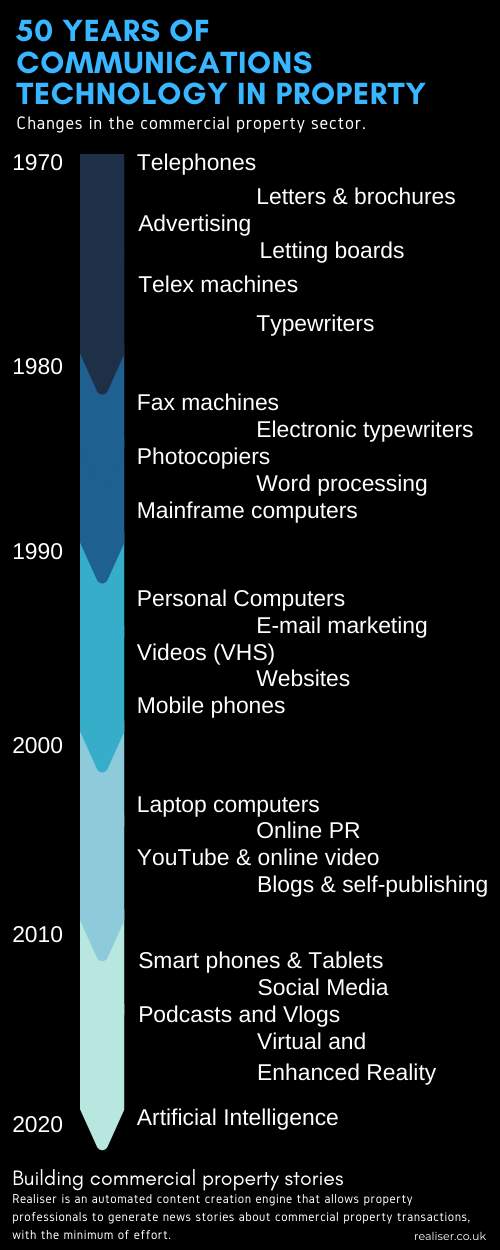How tech changed commercial property marketing

As a young child learning to read, I remember asking my father what a large 'To Let' board meant outside a shop on the High Street. On reflection, this small incident was my first introduction to commercial property marketing.
In many respects, the methodology of marketing commercial properties has changed very little over the years since - everyone still makes phone calls, letting boards are still placed outside buildings, property particulars and adverts are still created and stories about property deals are still published. The technology used to achieve these things, on the other hand, has changed dramatically.
Fifty years ago the advertising of properties using sale and letting boards, adverts and printed documents will have been very similar to the methods employed a hundred years ago. Telephones would have been more common, but everything else would have been very similar. Since then, there has been a dramatic transformation in communication technologies, and things that were considered science-fiction 30 or 40 years ago are now part of our everyday lives.
Technological milestones in property marketing: 1970s and 1980s
In the 1970s, the arrival of photocopiers and electronic typewriters changed the way that property agents created and distributed information regarding buildings and transactions. Hands up, who remembers Telex machines?!
The 1980s saw the arrival of such innovations as fax machines, mainframe computers and word processing - again, these transformed the way that we communicated with the market and increased our efficiency.
The digital transformation of the 1990s
Jump forward to the 1990s, and we were all excited by the “Information Superhighway” or, the Internet, as it became more commonly known. We began to have Personal Computers (PCs) on our desks and sent our first e-mail. Some of us even recorded videos of properties and posted VHS tapes (and later - DVDs) to potential tenants!
As the decade progressed, websites were the latest 'must-have' way of marketing real estate and property businesses. Mobile phones were also a growing business tool (even if they were like house bricks) and by the turn of the century, we began to see the widespread use of laptops and mobile computing. We stored data and documents on floppy disks and not in “the cloud”.
Entering the 21st century: new tools and techniques
Then, as the first decade of the millennium progressed, the office was filled with the sound of modems connecting, videos were posted on YouTube, and we distributed data and publicity materials on memory sticks. Websites were no longer just brochures but became places where we could self-publish and share content.
Over time, the ‘house bricks’ have evolved into Smartphones and agents and surveyors adopted tablets as a business and marketing tool (which have already, seemingly, ‘had their day’). Social Media became mainstream in the business world and brought with it a focus on instant communication. Real-time marketing was the order of the day.
More recently, we have seen the growth of the use of virtual reality and augmented reality as tools that can be used to promote real estate developments. And “PropTech” has become a thing. A big thing.
So what’s the next technology that will impact real estate?
Artificial Intelligence: the next frontier in property marketing
In 2017, the RICS published a document by Remit Consulting titled ‘The Impact of Emerging Technologies on the Surveying Profession’, which looked at how Artificial Intelligence (AI) and machine learning would (will) transform how surveyors work over the next few years.
It showed that 88% of tasks undertaken by surveyors were “suitable for automation via emerging technologies” and suggested that the businesses that utilised the power of AI to do mundane, repetitive tasks would benefit most from increased efficiency, particularly when combined with the valuable human skills of their workforce. The report also highlighted that AI would bring “An increase in the consistency, transparency and timeliness of transactions”.
Andrew Waller, one of the report’s authors, said: “Surveying practitioners that adapt their approach and utilise the new technologies will be able to bring added value to their clients through increased efficiencies. The new technologies will also present surveyors with the tools to be able to provide far more, high-level, strategic advice to their clients.”
The benefits of automation in commercial property marketing
While it will be a less visible change, the widespread adoption of AI will impact the marketing of commercial real estate and services.
As AI and machine learning technologies become commonly used by surveyors and agents to simplify everyday tasks and improve efficiency, Realiser is focused on assisting them, using its advanced algorithms to speed up the process of publishing and reporting transactions to a worldwide audience via traditional media outlets, websites and social media.
We’re looking forward to being part of the next sea-change in property marketing and publicity.
